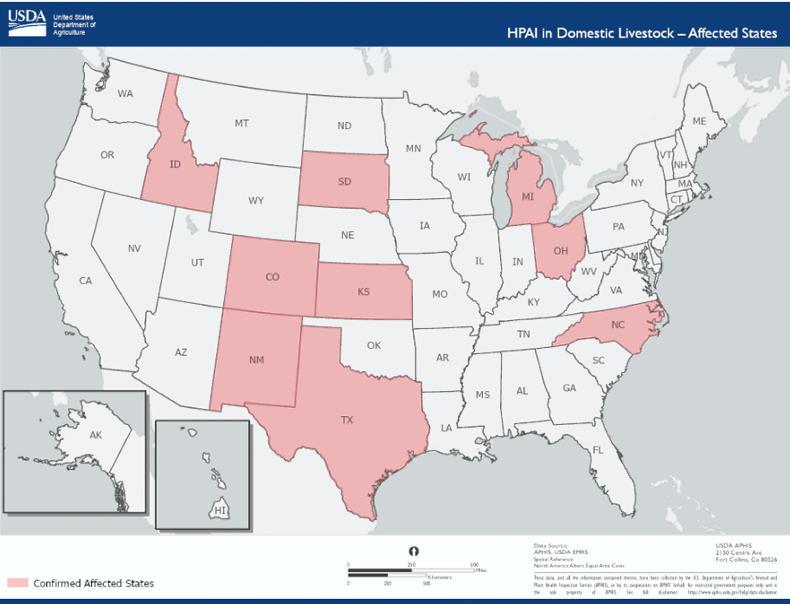Retail samples of beef mince in the US taken by federal regulators have tested negative for bird flu.
The US Department of Agriculture (USDA) said its Food Safety and Inspection Service (FSIS) took 30 samples of beef mince from retail outlets in states where dairy herds had tested positive for highly pathogenic avian influenza (HPAI).
All samples came back negative, the USDA confirmed.
“USDA is confident that the meat supply is safe. USDA has a rigorous meat inspection process, where USDA’s FSIS veterinarians are present at all federal livestock slaughter facilities.
“FSIS inspects each animal before slaughter and all cattle carcasses must pass inspection after slaughter and be determined to be fit to enter the human food supply,” the USDA added.
This comes following traces of bird flu being found in 20% of retail milk samples taken.
However, the Food and Drug Administration (FDA) said there is no evidence the disease poses a risk to human health or that the live virus is present on shop shelves.
States
Bird flu has been identified in dairy herds in nine states, across 36 herds.
These are located in Colorado, Idaho, New Mexico, Michigan, Texas, Kansas, South Dakota, North Carolina and Ohio.

Bird flu has been identified in dairy herds in nine states in the US. \ APHIS USDA
The first case was identified in a dairy herd in Texas in March 2024.
“USDA has identified spread between cows within the same herd, spread from cows to poultry, spread between dairies associated with cattle movements and cows without clinical signs that have tested positive,” it said.
Restrictions
The USDA’s Animal and Plant Health Inspection Service (APHIS) has imposed restrictions around inter-state movement of dairy cattle and mandatory reporting of the disease.
Before inter-state movement, dairy cattle are required to receive a negative test.
Where these cattle test positive, herd owners are required to provide epidemiological information.
Cattle moving inter-state must also adhere to conditions specified by APHIS.
Labs and state vets are now required by law to report detection of the disease to the APHIS.
Retail samples of beef mince in the US taken by federal regulators have tested negative for bird flu.
The US Department of Agriculture (USDA) said its Food Safety and Inspection Service (FSIS) took 30 samples of beef mince from retail outlets in states where dairy herds had tested positive for highly pathogenic avian influenza (HPAI).
All samples came back negative, the USDA confirmed.
“USDA is confident that the meat supply is safe. USDA has a rigorous meat inspection process, where USDA’s FSIS veterinarians are present at all federal livestock slaughter facilities.
“FSIS inspects each animal before slaughter and all cattle carcasses must pass inspection after slaughter and be determined to be fit to enter the human food supply,” the USDA added.
This comes following traces of bird flu being found in 20% of retail milk samples taken.
However, the Food and Drug Administration (FDA) said there is no evidence the disease poses a risk to human health or that the live virus is present on shop shelves.
States
Bird flu has been identified in dairy herds in nine states, across 36 herds.
These are located in Colorado, Idaho, New Mexico, Michigan, Texas, Kansas, South Dakota, North Carolina and Ohio.

Bird flu has been identified in dairy herds in nine states in the US. \ APHIS USDA
The first case was identified in a dairy herd in Texas in March 2024.
“USDA has identified spread between cows within the same herd, spread from cows to poultry, spread between dairies associated with cattle movements and cows without clinical signs that have tested positive,” it said.
Restrictions
The USDA’s Animal and Plant Health Inspection Service (APHIS) has imposed restrictions around inter-state movement of dairy cattle and mandatory reporting of the disease.
Before inter-state movement, dairy cattle are required to receive a negative test.
Where these cattle test positive, herd owners are required to provide epidemiological information.
Cattle moving inter-state must also adhere to conditions specified by APHIS.
Labs and state vets are now required by law to report detection of the disease to the APHIS.







 This is a subscriber-only article
This is a subscriber-only article









SHARING OPTIONS: